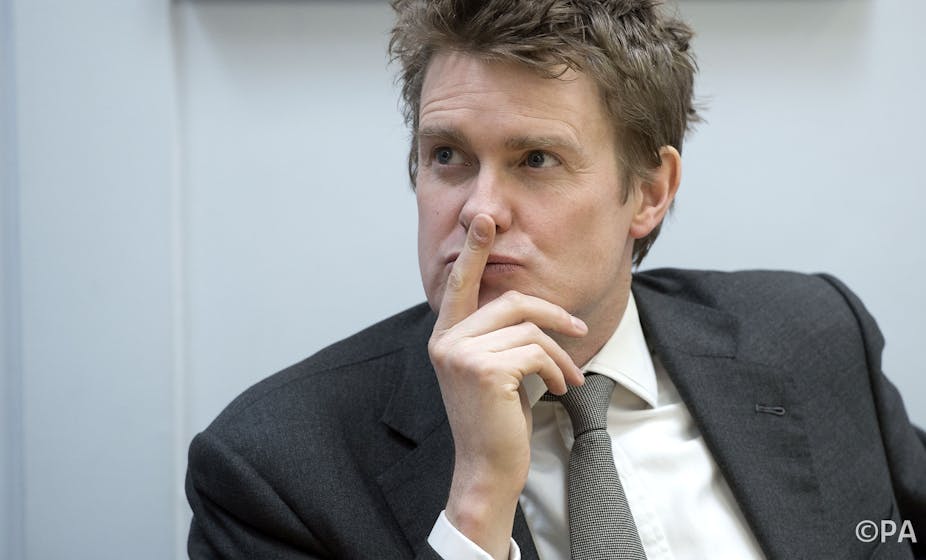On BBC Question Time on February 5, Labour’s shadow education minister Tristram Hunt made a remark appearing to link weak, unqualified teachers to religious education, specifically Catholic schooling provided by nuns. It was not clear at the time what he was trying to say, because he was interrupted. And the subsequent uproar in response has done little to clarify his point.
Hunt subsequently apologised and said he meant “no offence” by his comments. But it is time for some facts about whether there are disproportionately more unqualified teachers in religious schools, and then some calmer consideration about whether it matters.
Religion by religion
We combined two datasets published in 2014 from the Department of Education – one on the school workforce and one on school characteristics – and our analysis shows the number of teachers without recognised teacher training in each type of school in England. From the first graph below, it is clear that state-funded Roman Catholic schools – including those with nuns as teachers – are actually the least likely, on average, to employ unqualified teachers.

The long-standing schools of “no religious character”, and those with a Church of England or Catholic basis are at, or below, the national average for unqualified teachers. Rather, it is the relatively small number of schools for minority religions in England that have the most – with Muslim and Jewish schools well above the national average. These, if any, should be the target for Hunt’s concern.
Free schools should be the target
But if Hunt was really concerned about the prevalence of unqualified teachers in England’s schools – which Labour has criticised in opposition – then an even clearer target than faith-based schools in general would be all schools not under local authority control.

Free schools and academies, supported by both the current and the previous administration in the UK, have been made “independent” of their local council. Their autonomy means they are unchallenged by any state-representative organisation at local level. Rather, they are overseen directly by the Department for Education and the schools regulator Ofsted.
It is schools of this kind that have been the focus of faith-based alarms and scandals such as the “Trojan horse” affair in Birmingham. Perhaps not coincidentally, they also have markedly higher than average levels of unqualified teachers.
Religious segregation is a social problem
The Catholic and Church of England schools have been part of the state education system since it started. They are part of the reason why there is a universal school system. And, in many respects, they are very similar to bog-standard local authority schools with no religious character. But having them creates two current problems for the system as a whole.
First, the intakes of faith-based schools are somewhat socially and economically stratified in relation to the areas in which they recruit pupils, and this is especially true for Catholic schools. Given that they are neither more nor less effective in terms of public examination results than non-religious schools, this danger of social segregation between faiths and social groups is being run for no gain.
The newer faith-based schools, along with the much older schools for Jewish families, are even worse in this respect – often dividing children by ethnic as well as socio-economic characteristics. And this leads to the second problem. We cannot deny faith-based schools to some religions while permitting them for others. But to accept a multitude of different faith-based schools will likely splinter our schools and thus our society along sectarian lines.
Remove state funding
The only clear solution then is to remove the faith basis for all schools, making religion a personal, family or a place-of-worship issue. This would remove it from the organisation of a taxpayer-funded education system that is intended to equalise life chances and encourage the autonomous appraisal of evidence.
Abolishing the faith basis for all schools would deny no individual their freedom of worship, and cause no reduction in exam performance. It would remove a barrier to ethnic and social integration in society, remove at least six conflicting belief systems cluttering up the process of learning and might also lead to fewer unqualified teachers.
Of course, this might lead to a growth in small fee-paying schools with a strong religious basis and a high proportion of unqualified teachers, of a kind that already exist. But the quality of their provision is usually so poor that they do not survive long in competition to the state sector and the larger, well-established private schools – which incidentally tend to have fewer unqualified teachers than their volatile counterparts.
But, as the issues in Birmingham suggest, abolishing the independence of free schools and academies – or at least their right to employ unqualified teachers – should be seriously considered. The so-called “Trojan Horse” schools were not ostensibly religious in character. It was, it seems, their autonomy from local oversight that allowed problems to arise.
Next read: You wouldn’t want an unqualified doctor of lawyer… so why are untrained teachers ok?

